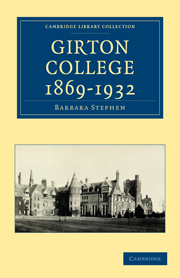Book contents
- Frontmatter
- Contents
- Preface
- Chapter I INTRODUCTION
- Chapter II PRELIMINARY WORK FOR THE COLLEGE
- Chapter III THE COLLEGE IN ITS PIONEER DAYS
- Chapter IV FROM HITCHIN TO GIRTON
- Chapter V GROWTH AND CONSOLIDATION 1875–1903
- Chapter VI A TIME OF TRANSITION 1903–1922
- Chapter VII THE ROYAL COMMISSION AND THE CHARTER
- Chapter VIII THE STATUTES OF 1926, AND THE NEW BUILDINGS
- Chapter IX VARIOUS MATTERS
- Biographical Index
- Index
- Plate section
Chapter VII - THE ROYAL COMMISSION AND THE CHARTER
Published online by Cambridge University Press: 05 July 2011
- Frontmatter
- Contents
- Preface
- Chapter I INTRODUCTION
- Chapter II PRELIMINARY WORK FOR THE COLLEGE
- Chapter III THE COLLEGE IN ITS PIONEER DAYS
- Chapter IV FROM HITCHIN TO GIRTON
- Chapter V GROWTH AND CONSOLIDATION 1875–1903
- Chapter VI A TIME OF TRANSITION 1903–1922
- Chapter VII THE ROYAL COMMISSION AND THE CHARTER
- Chapter VIII THE STATUTES OF 1926, AND THE NEW BUILDINGS
- Chapter IX VARIOUS MATTERS
- Biographical Index
- Index
- Plate section
Summary
Miss Phillpotts's Mistress-ship (1922–5). Report of the Royal Commission (1922). The Ordinances of 1923. The Statutory Commission (1923). The Charter (1924). Benefactions to the College. The Fellows' Dining Room.
With the resignation of Miss Jex-Blake in 1922, the College entered upon a new period of its history. The retiring Mistress's position in regard to past students was of a character that could not be continued. She was personally acquainted with them all, and had actually been in residence with all except the small number who had left before she entered the College as a Scholar in 1879. Subsequent generations must lose this very special bond, whatever else they gain. Miss Jex-Blake was succeeded by her cousin, Miss Phillpotts (afterwards Dame Bertha Newall), who had entered the College in 1899 as a Pfeiffer Scholar. She held a Pfeiffer Studentship of £50 a year for the years 1903—4 and 1905—6, and served as Librarian from 1906 to 1909. She was therefore well known at Girton. “We feel that you alone could take the place of Miss Jex-Blake”, were the words used by the senior student in welcoming her on behalf of the students at the beginning of her Mistress-ship.
Miss Phillpotts's experiences after resigning the Librarianship at Girton had been of an unusual kind. She spent some years in independent study of the Scandinavian languages, during which she acted as private secretary to Baron Anatole von Hugel, Curator of the University Museum of Archaeology and Ethnology.
- Type
- Chapter
- Information
- Girton College 1869–1932 , pp. 114 - 128Publisher: Cambridge University PressPrint publication year: 2010First published in: 1933



